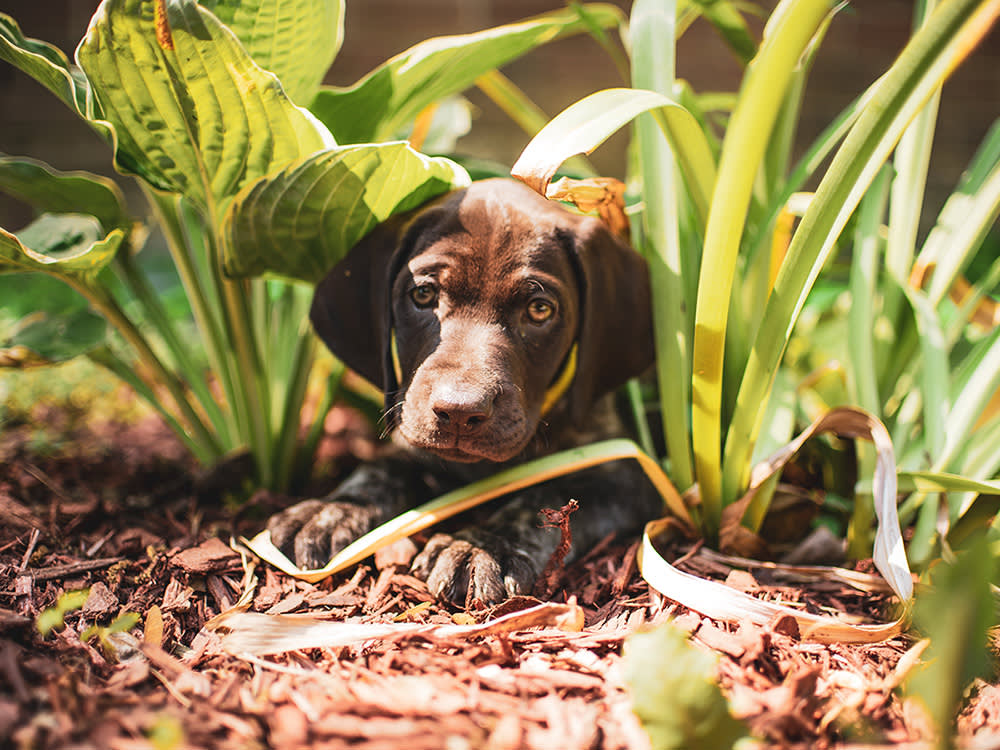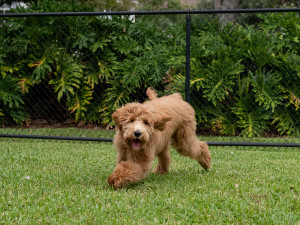“Can My Dog Be Trained Not to Dig?”
Stop your dog from digging up your favorite plants with expert advice from animal behaviorist Karen London, PhD.

Share Article
I recently adopted my first Terrier-mix, a charming two-year-old dog named Ezra. He steals socks and buries them in my garden (at least now I know what happened to them). He’s also digging up some of my favorite plants. Do you have any advice on how to stop him from digging?
Many dogs dig and Terriers are notorious for it—no surprise, given that many of them were bred to dig for vermin. They dig to bury things (like Ezra’s doing), for entertainment, to ease boredom, to cool off, and sometimes to escape. Here are a few strategies you can use to stop your dog from digging up the yard.
First, show them where it is okay to dig.
Since digging is such a natural behavior for dogs, it’s often easier to channel that urge to an appropriate place rather than to eliminate it completely. Make it easier and more tempting for Ezra to dig in a place you set up for that purpose. Create a digging area with sand, dirt, and treasures to make that location a better, more fun choice. Start by half-burying a bone, stuffed Kong, or another prized item in the designated area to teach your dog that it’s worth his time to dig there. As time goes on, you can make treasures harder to find, but it’s important that he have success right away, so he has good motivation to return to dig where he’s allowed (and encouraged) to do so.
Provide plenty of enrichment.
Many dogs dig when they’re bored. If they have other options, some will forego the digging. That means an essential part of dealing with a digging dog is to add activities to their day. There are two general approaches: work the body and work the mind. More physical exercise can make a huge difference, especially if it’s the kind of effort that really tires him out. Extra time on leashed walks is good, but running off-leash until he’s truly tired— chasing balls or playing with a dog buddy—is often more effective at changing behavior.

Mental exercise is also an important part of keeping a dog from finding their own amusements, whether that’s burying socks or digging up plants. Chew toys, food puzzles, stuffed toys like Kongs, searching for hidden treats in the house, and training sessions are all ways to keep your dog’s mind busy.
Preventing trouble is half the battle.
Managing the situation, so your dog doesn’t have the opportunity to do what you don’t want him to do is a big piece of the puzzle. (This is true for any behavioral issue, by the way.) Management may include setting up barriers such as fencing or chicken wire around areas you do not want them to dig. It could also involve spraying a scent your dog doesn’t like around the area you seek to protect. (Tip: Many dogs don’t care for citrus scents.) If you have mice, shrews or any other little critters that make your yard smell delicious to your dogs, do what you can to remove them with humane and non-toxic methods. Finally, do all you can to keep socks—and any other treasures your dog likes to bury—out of reach.
Don’t give him the freedom to make mistakes.
For now, while you’re teaching him this new habit, don’t allow him to be outside if you can’t supervise him or offer him something else to do. When you’re out in the yard together, give him a frozen stuffed Kong and observe how much time he spends on it. Once you know how long it will keep him occupied, you’ll know how long he can be outside without you. If you see him digging where he’s not allowed to, it’s essential that you react to it—redirect him to his own spot or involve him in some other activity instead.
Model appropriate behaviors.
Many dogs watch us dig in an area and then do the same thing. Until he learns that he may not dig in your garden or yard and is content to dig only in his special digging area, don’t let your dog observe you digging. What you see as undesirable behavior may just be his way of joining in the fun.
Though digging is a natural dog behavior, it can be very inconvenient and irritating. The good news is that there’s a lot you can do to make the situation a happier one for both of you. A love of digging is part of who Ezra is, but you can train him to dig less and on your terms.

Karen B. London, PhD, CAAB, CPDT-KA
Karen B. London is a certified applied animal behaviorist (CAAB) and certified professional dog trainer (CPDT) who specializes in working with dogs with serious behavioral issues, including aggression. She has written for a variety of magazines including The Bark, Clean Run, and the APDT Chronicle of the Dog, and has published in scientific journals including Behavioral Ecology and Sociobiology, Ethology, Ecology, and Evolution, the Journal of Insect Behavior, and Insectes Sociaux. She is the author of seven books about dog training and canine behavior, including the forthcoming My Dog's Mystery Adventure: And Other Stories From a Canine Behaviorist and Dog Trainer.
Related articles
![goldendoodle puppy playing in grass in yard]()
The Dirt on Dog-Proofing Your Yard
10 steps to a safe outdoor space. Landscaper not required.
![Rottweiler puppy chewing on a white flower in a garden]()
Snail Bait Poisoning in Dogs: Symptoms, Treatment, and Prevention
It may protect your plants, but at what cost? A veterinarian explains how this toxin may keep your garden safe — but it’s extremely toxic to dogs. Here’s everything you need to know.
![Puppy laying in torn up paper on the couch]()
New Puppy Driving You Nuts? Here’s How to Deal
The beginning of puppy parenthood can be rough, but it does get better — especially when you implement this advice.
![Hiker and dog overlooking the top of a mountain]()
8 Ways to Be a More Eco-Friendly Pet Parent in 2025
Expert tips to help reduce your pet’s carbon footprint. (Pawprint? You get it.)



